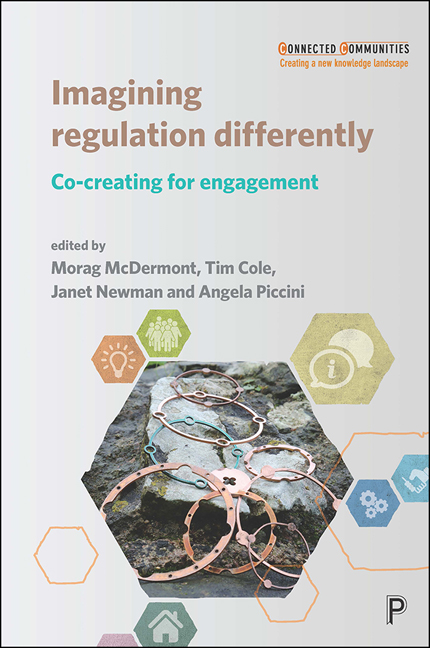Book contents
- Frontmatter
- Dedication
- Contents
- List of Figures, Tables and Boxes
- List of Abbreviations and Acronyms
- Notes on Contributors
- Acknowledgements
- Series Editors’ Foreword
- 1 Introduction: From the Regulation of Engagement to Regulating for Engagement
- 2 Co-Production as Experimentation: the Research Forum as Method
- Interlude: Community Researchers and Community Researcher Training
- 3 Beyond Prevent: Muslim Engagement in city Governance 49
- 4 Regulating for ‘care-ful’ knowledge Production: Researching Older People, Isolation and Loneliness
- 5 Who Gets to Decide what’s in my Fridge? Principles for Transforming the ‘Invisible Rules’ Shaping the Regulation of Food Habits in Urban Spaces
- 6 Life Chances: Thinking with art to Generate new Understandings of Low-Income Situations
- 7 The Making, Mapping and Mobilising in Merthyr Project: Young People, Research and arts Activisms in a Post-Industrial Place
- 8 Regulating Engagement Through Dissent
- 9 The role of Community Anchor Organisations in Regulating for Engagement in a Devolved Government Setting
- 10 Conclusion: Towards an Organic model of Regulating for Engagement
- Postscript: Engaging the University?
- References
- Index
Postscript: Engaging the University?
Published online by Cambridge University Press: 03 March 2021
- Frontmatter
- Dedication
- Contents
- List of Figures, Tables and Boxes
- List of Abbreviations and Acronyms
- Notes on Contributors
- Acknowledgements
- Series Editors’ Foreword
- 1 Introduction: From the Regulation of Engagement to Regulating for Engagement
- 2 Co-Production as Experimentation: the Research Forum as Method
- Interlude: Community Researchers and Community Researcher Training
- 3 Beyond Prevent: Muslim Engagement in city Governance 49
- 4 Regulating for ‘care-ful’ knowledge Production: Researching Older People, Isolation and Loneliness
- 5 Who Gets to Decide what’s in my Fridge? Principles for Transforming the ‘Invisible Rules’ Shaping the Regulation of Food Habits in Urban Spaces
- 6 Life Chances: Thinking with art to Generate new Understandings of Low-Income Situations
- 7 The Making, Mapping and Mobilising in Merthyr Project: Young People, Research and arts Activisms in a Post-Industrial Place
- 8 Regulating Engagement Through Dissent
- 9 The role of Community Anchor Organisations in Regulating for Engagement in a Devolved Government Setting
- 10 Conclusion: Towards an Organic model of Regulating for Engagement
- Postscript: Engaging the University?
- References
- Index
Summary
Introduction
This postscript offers both a celebration of the achievements of the Productive Margins (PM) research programme and an attempt to set it in the broader context of contemporary political possibilities – and constraints. My particular focus is on attempts to transform universities into instruments of engagement and connectedness – to turn them inside out. This is an attempt to take the ‘productive’ emphasis of the programme seriously, and to ask how far, or in what ways, the engagement of ‘communities at the margins’ has the potential to transform university hierarchies of knowledge and power.
In addressing this question, the programme raises a number of issues that, if pursued in future work, have a transformative potential. However, it raises further questions that remain unresolved, and that may limit the impact of transformative agendas:
• The politics of co-production: is it possible to co-produce research across inequalities of power and divergent objectives?
• The politics of policy: how can research that retains a commitment to notions of complexity and emergence persuade policymakers of its utility and legitimacy?
• The politics of the academy: how can researchers manage the tensions between the demands of their institutions, their own values and the requirements of publishing and career advancement?
I will return to these questions at various points (especially in the later section on ‘Working the borders’), but I first want to highlight the distinctiveness and importance of the PM programme.
One of the objectives of the programme was ‘to shift the way research in higher education is conducted in order to bring in and acknowledge the expertise and experience of communities at the margins into the whole research process, from programme design to data collection through to analysis and dissemination’ (Productive Margins, 2018). This objective has three features that mark it out from other forms of innovation in research. First, it is concerned with bringing in excluded forms of knowledge and expertise, rather than disseminating it after the event (though, as Chapter 10 suggested, the latter also matters if the intention is to effect a change in the thinking and practice of policymakers). Second, it references the whole research process, rather than engagement in one aspect (for example, data collection or dissemination).
- Type
- Chapter
- Information
- Imagining Regulation DifferentlyCo-creating for Engagement, pp. 207 - 216Publisher: Bristol University PressPrint publication year: 2020



